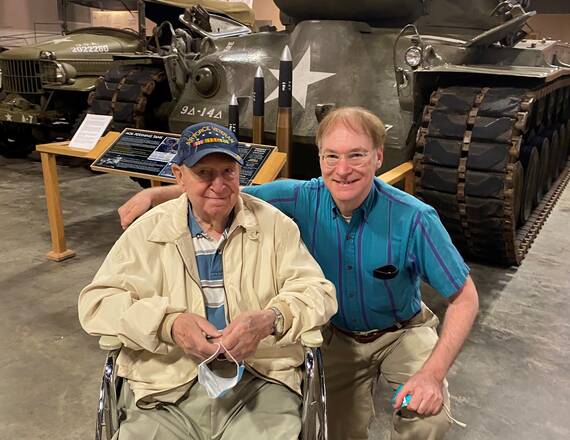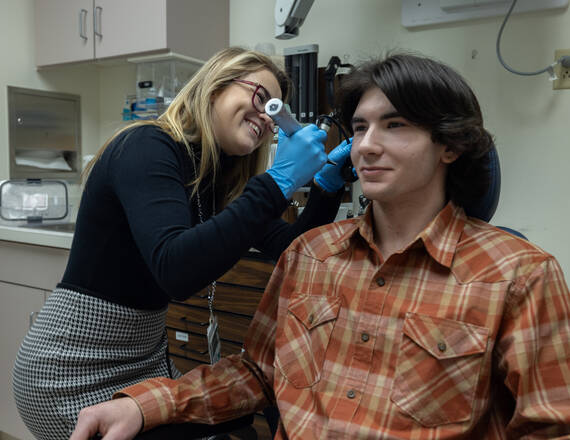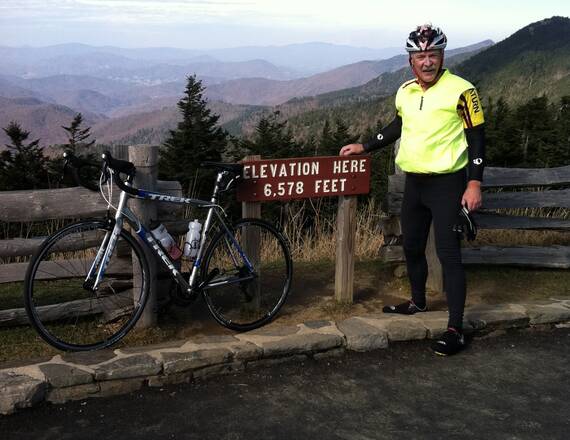A custodian, a palliative care patient, and a grateful son. This is their story.
Every day for the month that Normand W. Madore was a patient at the Jack Byrne Center for Palliative & Hospice Care at Dartmouth Hitchcock Medical Center, his son James would eat lunch with him. While Normand’s lunch was brought to his room, James would go to the hospital cafeteria to pick up his own meal. It was a routine of normalcy and companionship between a father and son during a time that can often feel lonely and unsettling.
But on one particular day, James was delayed returning from the cafeteria. He’d run into one of his father’s doctors who asked after Normand. When the conversation ended, James realized that back in his father’s room, Normand’s lunch was likely getting cold. And, facing the difficulties of terminal bladder cancer, Normand now needed help to eat.

James sprinted back to Normand’s room, worried that his father was watching his food get cold in his absence. But when he walked through the door, he found his father was not alone. Rather, the Jack Byrne Center’s Environmental Services Technician, Sarah Mayotte, was sitting with Normand, talking with him as if he were her own father, and feeding him lunch.
“I couldn’t believe it,” James says. “Sarah has a lot of responsibilities, and here she was taking time to feed my father because he couldn’t feed himself. She was not paid to feed my father. She did this out of love. That’s emblematic of the culture that’s been created at the Jack Byrne Center. Everybody looks at the patient as the most important person.”
To Mayotte, “it was just helping somebody. Working in that kind of environment, we see people at their most emotional times.” She maintains the 30,000-square-foot building, doing the laundry, taking the trash out, shampooing carpets, lighting the fireplace in the morning, and more in order to make the Jack Byrne Center feel as comfortable and supportive as possible. Mayotte doesn’t always get the opportunity to interact with patients, but when she does, she makes a point to get to know them, offering company and conversation, treating everyone, including Normand, “the way I would want my father treated, if he were the next person there.”
Besides, she adds, remembering what was on Normand’s lunch plate that day, “let’s be real. Who wants to eat cold scrambled eggs?”
The lunch with Mayotte was one of Normand’s last at the Jack Byrne Center for Palliative & Hospice Care. Shortly thereafter, his strength had improved enough for him to spend his final six weeks of life at home, and he was discharged (a rarity for a palliative care center). Normand’s month at the Jack Byrne Center was the culmination of years of care that he received at DHMC, from a heart attack to cancer treatments. Every step of the way, James says, his father was treated with kindness and humanity.
“It seemed effortless,” James says. “This is who these people are. They gave him dignity. He was very grateful to DHMC.”
DHMC also provided support for James as he navigated the difficult and emotional task of managing his father’s end-of-life care. James is Normand’s only child, so when Normand was discharged from the Jack Byrne Center, his care fell to James. Before they left the center, the staff trained and empowered James to continue caring for his father, teaching him how to bathe and feed his father, and letting him borrow some equipment. The chef, Peggy Bowen, even gave James the recipe for a maple walnut banana smoothie that Normand had come to love.
“I wasn’t in this alone,” James says. “I could do what I could do, which was be his son, because I had partners [in DHMC and the Jack Byrne Center]. I felt like Dad and I were not alone. There was this huge safety net.”
When Normand was first diagnosed with bladder cancer, he was living in Florida. A New Hampshire resident, Normand had begun heading south for the winters many years ago. But he always preferred to receive his treatment at DHMC. He’d already had a bout with T-cell Lymphoma, and received treatment for more than a decade from DHMC hematologist/oncologist Erick Lansigan, MD. Not only had Dr. Lansigan treated Normand in New Hampshire, he helped arrange treatment for Normand while he wintered in Florida. Normand trusted the doctor in New Hampshire, James says, and the first thing he said when he received the bladder cancer diagnosis was, ‘We’re going to see Dr. Lansigan.’
The fondness was mutual. “I was saddened to learn he developed another cancer,” Dr. Lansigan says. “Normand was so kind-hearted whenever he came for his visits for a specialty procedure for his rare skin lymphoma. He would bake muffins for the photopheresis staff and we always enjoyed his visits.”
“When someone has a rare diagnosis and finds experts in treating them close to home, I think they are even more appreciative of the care they receive,” the doctor adds. At the Dartmouth Cancer Center, “we are a small community but we pride ourselves in delivering world-class care.”
Throughout his treatment at DHMC and into his stay at the Jack Byrne Center, Normand was visited by Samuel Seyd, a staff chaplain in the DHMC Office of Spiritual Health. “His spirits were lifted every time Father Sam entered the room,” says James, adding that his father was looking for spiritual guidance as he faced the end of his life. The Catholic chaplain would visit Normand every other day, and on the days he couldn’t come, he would arrange for another chaplain to visit.
“DHMC extended his life and improved his quality of life,” James says of Normand’s days at the hospital and Jack Byrne Center. “And that starts with Dr. Lansigan and goes all the way to Sarah.”
“We had all these wonderful people who we didn’t know before, and they became our partners,” he adds. “They became part of our family.”
For James, the care shown his father by everyone at Dartmouth Health has solidified his plans for his own golden years. “I’m going to retire to New Hampshire, and I will be a patient at Dartmouth Health,” he says. “Why would I go to the second best, when I can go to the first best?”

